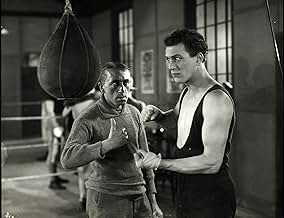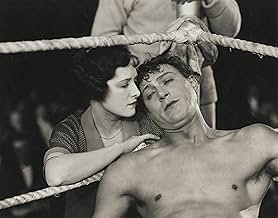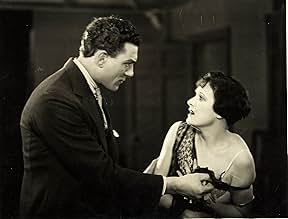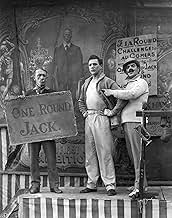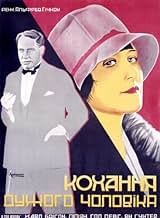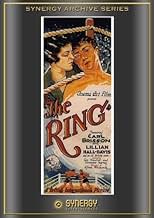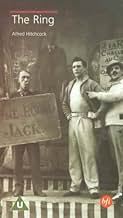IMDb RATING
6.1/10
4.2K
YOUR RATING
Two boxers compete for the love of a woman.Two boxers compete for the love of a woman.Two boxers compete for the love of a woman.
- Director
- Writers
- Stars
Lillian Hall-Davis
- The Girl
- (as Lilian Hall Davis)
Eugene Corri
- Eugene Corri
- (uncredited)
Charles Farrell
- Second
- (uncredited)
Clare Greet
- Fortune Teller
- (uncredited)
Lawrence Hanray
- Clerrgyman in Black Cassock
- (uncredited)
Tom Helmore
- Spectator
- (uncredited)
Alfred Hitchcock
- Man-Dipping Attraction Worker
- (uncredited)
Minnie Rayner
- Boxing Contestant's Wife
- (uncredited)
Brandy Walker
- Spectator
- (uncredited)
Bombardier Billy Wells
- Boxer
- (uncredited)
- Director
- Writers
- All cast & crew
- Production, box office & more at IMDbPro
Featured reviews
I really wanted to like this one, even watching it twice in the past week, thinking that it might grow on me (as Hitchcock's Number Seventeen has done, slightly) but it just doesn't do anything for me. Apparently, it didn't do much for the audiences in 1927 either, because from what I've been able to find out about it, despite being popular with critics, it sank at the box office.
Hitchcock not only directed but also wrote this boring melodrama, a combination of two of my least favourite genres: boxing, and romance. The world of boxing provides the backdrop for this formulaic triangle between two competitors and the girl who loves them both: but which man does she really want to marry?
The title is good, with several layered meanings in relation to the story. The fact that the film used few title cards was unique, letting visuals tell the story by themselves. There are a lot of clever visuals by Hitchcock: as we look up through the water of a pond at the two lovers; placing the ring on her finger at the marriage ceremony, only to have the bracelet slip down to her wrist, reminding her (and the audience) of the other man; girl, sitting on hubby's lap, glances across the room toward a mirror, and sees reflection of the "other man"; fingers flittering away on the ivories, distorted - but the plot, again written by Hitchcock himself, was a routine melodrama which could hardly hold my attention.
Beautiful, slightly Gothic looking church in which the ceremony occurs is an asset to the film in its few, brief scenes. Goofball comically blowing the suds off the beer, then downing it, and the film's subsequent distorted Point-Of-View shot is an amusing moment. Was this film, released October 1927, the first to use POV shots?
Hitchcock not only directed but also wrote this boring melodrama, a combination of two of my least favourite genres: boxing, and romance. The world of boxing provides the backdrop for this formulaic triangle between two competitors and the girl who loves them both: but which man does she really want to marry?
The title is good, with several layered meanings in relation to the story. The fact that the film used few title cards was unique, letting visuals tell the story by themselves. There are a lot of clever visuals by Hitchcock: as we look up through the water of a pond at the two lovers; placing the ring on her finger at the marriage ceremony, only to have the bracelet slip down to her wrist, reminding her (and the audience) of the other man; girl, sitting on hubby's lap, glances across the room toward a mirror, and sees reflection of the "other man"; fingers flittering away on the ivories, distorted - but the plot, again written by Hitchcock himself, was a routine melodrama which could hardly hold my attention.
Beautiful, slightly Gothic looking church in which the ceremony occurs is an asset to the film in its few, brief scenes. Goofball comically blowing the suds off the beer, then downing it, and the film's subsequent distorted Point-Of-View shot is an amusing moment. Was this film, released October 1927, the first to use POV shots?
The Ring was made from the only screenplay Hitchcock wrote himself and it deals, as many of his earliest pictures do, with a love triangle. At first glance, it looks like a more cynical update of the infidelity-themed morality comedies of Cecil B. De Mille, but more than that it is the first really competent Hitchcock picture. Even if he was not yet using the ideas and motifs of suspenseful thrillers, he was at least developing the tools with which to create suspense.
As well as being a student of the German Expressionist style, the rhythmic editing style of Sergei Eisenstein had had its impact upon Hitchcock. But here he keeps tempo not just with the edits but with the content of the imagery. This is apparent from the opening shots, where spinning fairground rides brilliantly establish a smooth tempo. And like Eisenstein, the editing style seems to suggest sound for example when a split-second shot of the bell being rung is flashed in, we almost subconsciously hear the sound because the image is so jarring.
There is also a contrast, particularly with silent films from the US, in that The Ring is not cluttered up with too many title cards. As much as possible is conveyed by imagery, and Hitch has enough faith in the audience to either lip-read or at least infer the meaning of the bulk of the characters' speech. And it's not done by contrived symbolism or overacting, it's all done by getting the right angles and the right timing, particularly with point-of-view shots, as well as some strong yet subtle performances. There are unfortunately a few too many obvious expressionist devices (particularly double exposures), many of which were unnecessary, but there is far less of this than there is in The Lodger.
Let's make a few honourable mentions for the aforementioned actors. First up, the stunningly handsome and very talented Carl Brisson in the lead role. In spite of his talent I was at first a bit confused as to why he got the role, as to be honest he looks more like a ballet dancer than a pugilist! But that just goes to show how much I know, as it turns out Brisson was in fact a former professional boxer and inexperienced in acting. Playing his rival is the competent Ian Hunter, who would go on to have a lengthy career in supporting roles right up to the 60s. The most demanding role in The Ring has to be that given to Lillian Hall-Davis, torn between two lovers. She pulls it off very well however with an emotive, understated performance, and it's a shame her career never lasted in the sound era. And last but not least the great Gordon Harker provides some comic relief in what is probably his best ever role.
The Ring's climactic fight scene is among the most impressive moments of silent-era Hitchcock. Martin Scorcese may have had his eye on The Ring when he directed the fight scenes in Raging Bull, as his watchword for these scenes was "Stay inside the ring". The fight in The Ring starts off with some fairly regular long shots, but when the action intensifies Hitchcock drops us right in the middle of it, with close-ups and point-of-view shots. Hitchcock's aim always seems to have been to involve his audience, and this was crucial in his later career where the secret of his success was often in immersing the viewer in the character's fear or paranoia.
The Ring really deserves more recognition than the inferior but better known The Lodger. It's a much more polished and professional work than the earlier picture, and probably the best of all his silent features.
As well as being a student of the German Expressionist style, the rhythmic editing style of Sergei Eisenstein had had its impact upon Hitchcock. But here he keeps tempo not just with the edits but with the content of the imagery. This is apparent from the opening shots, where spinning fairground rides brilliantly establish a smooth tempo. And like Eisenstein, the editing style seems to suggest sound for example when a split-second shot of the bell being rung is flashed in, we almost subconsciously hear the sound because the image is so jarring.
There is also a contrast, particularly with silent films from the US, in that The Ring is not cluttered up with too many title cards. As much as possible is conveyed by imagery, and Hitch has enough faith in the audience to either lip-read or at least infer the meaning of the bulk of the characters' speech. And it's not done by contrived symbolism or overacting, it's all done by getting the right angles and the right timing, particularly with point-of-view shots, as well as some strong yet subtle performances. There are unfortunately a few too many obvious expressionist devices (particularly double exposures), many of which were unnecessary, but there is far less of this than there is in The Lodger.
Let's make a few honourable mentions for the aforementioned actors. First up, the stunningly handsome and very talented Carl Brisson in the lead role. In spite of his talent I was at first a bit confused as to why he got the role, as to be honest he looks more like a ballet dancer than a pugilist! But that just goes to show how much I know, as it turns out Brisson was in fact a former professional boxer and inexperienced in acting. Playing his rival is the competent Ian Hunter, who would go on to have a lengthy career in supporting roles right up to the 60s. The most demanding role in The Ring has to be that given to Lillian Hall-Davis, torn between two lovers. She pulls it off very well however with an emotive, understated performance, and it's a shame her career never lasted in the sound era. And last but not least the great Gordon Harker provides some comic relief in what is probably his best ever role.
The Ring's climactic fight scene is among the most impressive moments of silent-era Hitchcock. Martin Scorcese may have had his eye on The Ring when he directed the fight scenes in Raging Bull, as his watchword for these scenes was "Stay inside the ring". The fight in The Ring starts off with some fairly regular long shots, but when the action intensifies Hitchcock drops us right in the middle of it, with close-ups and point-of-view shots. Hitchcock's aim always seems to have been to involve his audience, and this was crucial in his later career where the secret of his success was often in immersing the viewer in the character's fear or paranoia.
The Ring really deserves more recognition than the inferior but better known The Lodger. It's a much more polished and professional work than the earlier picture, and probably the best of all his silent features.
The symbolic use of objects, form editing, the position of characters in the scene... these were all used with such joyous abandon by Hitchcock that you can really see what a fertile genius he had. The way the wife moves from one corner of the ring to the other as the fight progresses, the editing when the wedding ring is placed on her finger... while these may seem a bit obvious by todays standards, in the silent era they spoke volumes about the story without a word being spoken. Even the title has a least four meanings that I can see; the boxing ring, the wedding ring, the bracelet the lover buys, and the love triangle at the heart of the story.
"The Ring" is a surprisingly torpid little film which I thought was not one of The Master's better efforts. Yes, yes, I know, there were some of his signature cinematic compositions and visual touches, but the play's the thing, right? This was pretty ordinary subject matter for someone with Hitch's reputation - love triangle, jealousy, revenge, etc. There were no surprises, no maguffins, no suspense, just plodding drama.
Maybe the best part of this film is the casting. I enjoyed watching Carl Brisson very much as the cuckolded husband, "One-Round Jack" and the always affable Ian Hunter - even when playing a cad, although he is slightly paunchy for a heavyweight champ. Hitch also got a lot of mileage from the entertaining Gordon Harker as Jack's second.
But I disagree with some reviewers that this was one of Hitchcock's better silents. "The Manxman" is a far superior film, and also stars Brisson as a cuckolded husband. That was a story you could get your teeth into; not so with "The Ring", which was pure pablum.
Maybe the best part of this film is the casting. I enjoyed watching Carl Brisson very much as the cuckolded husband, "One-Round Jack" and the always affable Ian Hunter - even when playing a cad, although he is slightly paunchy for a heavyweight champ. Hitch also got a lot of mileage from the entertaining Gordon Harker as Jack's second.
But I disagree with some reviewers that this was one of Hitchcock's better silents. "The Manxman" is a far superior film, and also stars Brisson as a cuckolded husband. That was a story you could get your teeth into; not so with "The Ring", which was pure pablum.
It's basically just a love-triangle story, but Hitchcock's storytelling skills and mastery of silent film techniques make "The Ring" well worth watching. There is a lot of visual detail and symbolism that add meaning to a basically routine story about small-time boxer Jack, his girl, and the champion who gives Jack his big break but who also tries to steal his girl.
The opening sequence establishes the triangle amidst the colorful atmosphere of a traveling show, where Jack takes on all comers inside a tent. It is filled with a lot of detail, especially the bracelet that Bob, the champion, gives to Jack's girl, which is important as a plot element and as a symbol. (This "ring" is one of several meanings of the film's nicely-chosen title.) Most of the plot that follows is predictable, as it is clear from the beginning that someday Bob and Jack will have to square off in the ring with more than Bob's title at stake. But if the story is routine, Hitchcock's technique is not. There are a lot of creative touches that develop the characters and story, and that add humor and interest. The cast is pretty good, and some of the secondary characters from the traveling show are very funny in the earlier scenes.
This is certainly an old-fashioned movie, and won't be of general interest today, but it's a nice little film. Anyone who likes silent films or who wants to see something quite different from the "Master of Suspense" should find this worth a look.
The opening sequence establishes the triangle amidst the colorful atmosphere of a traveling show, where Jack takes on all comers inside a tent. It is filled with a lot of detail, especially the bracelet that Bob, the champion, gives to Jack's girl, which is important as a plot element and as a symbol. (This "ring" is one of several meanings of the film's nicely-chosen title.) Most of the plot that follows is predictable, as it is clear from the beginning that someday Bob and Jack will have to square off in the ring with more than Bob's title at stake. But if the story is routine, Hitchcock's technique is not. There are a lot of creative touches that develop the characters and story, and that add humor and interest. The cast is pretty good, and some of the secondary characters from the traveling show are very funny in the earlier scenes.
This is certainly an old-fashioned movie, and won't be of general interest today, but it's a nice little film. Anyone who likes silent films or who wants to see something quite different from the "Master of Suspense" should find this worth a look.
Did you know
- TriviaAccording to the dialogue card at 1:19:06, the big fight between Jack Saunders and Bob Corby was refereed by Eugene Corri, who entered the ring wearing a tux. Corri made boxing history in December 1907 by being the first referee to referee inside the ring during a fight.
- GoofsDuring the first boxing scene, when the assistant is helping the sailor put on his coat, the coat is on nearly all the way; then, in the next shot, it is shown being put back on again.
- Quotes
The Promoter: If you win this next fight with the nigger, you'll be in the running for the championship.
- ConnectionsFeatured in Silent Britain (2006)
- How long is The Ring?Powered by Alexa
Details
- Runtime
- 1h 56m(116 min)
- Sound mix
- Aspect ratio
- 1.33 : 1
Contribute to this page
Suggest an edit or add missing content

